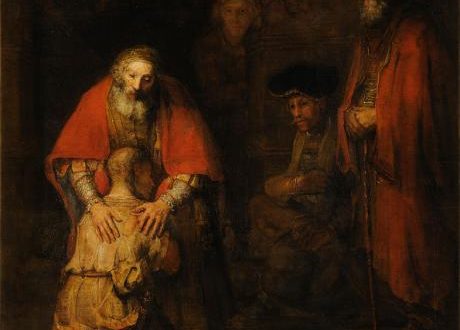Mary, the birth mother of Jesus
Luke 1:46–55 forms part of the optional lectionary readings for the third Sunday of Advent, which is December 13th. The focus is on Mary, the mother of Jesus.
A short time after Gabriel departed, Mary made preparations and quickly traveled from Nazareth to an unnamed town in the hill country of Judea. This is where Elizabeth and Zechariah lived (Luke 1:39). Mary possibly journeyed 50 to 70 miles by herself, which would have been a considerable distance for a single, pregnant teenager in her day.
Perhaps Mary went to stay with Elizabeth to be secluded from inquisitive friends and neighbors. The privacy would give Mary an opportunity to reflect on all that was happening in her life. She would also have a chance to receive encouragement and support from Elizabeth, whom Mary greeted when she entered the elderly couple’s home (v. 40).
Verse 41 says that at the sound of “Mary’s greeting,” Elizabeth’s baby made a sudden motion in her womb. This reminds us of verse 15, where Gabriel announced to Zechariah that even before John (the Baptizer) was born, he would be “filled with the Holy Spirit.”
The idea is that this unborn child was in some manner sensitive to the prompting of the Spirit. In turn, the Spirit would empower John to bear witness to the advent of the Messiah.
Likewise, verse 41 reveals that Elizabeth was “filled with the Holy Spirit.” This truth implies that when Elizabeth spoke about the Christ child, she was enabled to do so by the Spirit.
Elizabeth exclaimed that both Mary and the offspring in her womb were “blessed” (v. 42). By this Elizabeth meant that Mary was uniquely privileged to be the mother of Jesus.
Elizabeth asked why Mary, the “mother of my Lord” (v. 43), decided to visit her older relative. Elizabeth conveyed an attitude of humility, as well as surprise at Mary’s arrival.
Elizabeth emphasized the great honor it was for Mary, the mother of the Messiah, to spend some time with her relative. Elizabeth stated that her baby joyfully moved around the instant his mother heard Mary’s voice (v. 44).
The key point in Elizabeth’s remarks is the faith of Mary. Verse 45 reminds us that when the angel, Gabriel, relayed God’s promise concerning the miraculous conception of Jesus in Mary’s womb, she believed the Lord would fulfill His pledge.
Not only did Mary accept God’s will for her, but also Mary rejoiced in it (v. 46). Her canticle is traditionally known as the Magnificat, which in Latin means “my soul magnifies.”
The ode is reminiscent of the song of Hannah, the mother of Samuel (1 Sam 2:1–10). For instance, like Hannah, Mary extolled God’s greatness. Also, both women are called God’s handmaidens, or maidservants, which emphasizes their availability to do the Lord’s will.
Yet, Mary’s situation was much different. While Hannah rejoiced after her stigma of barrenness was gone, Mary sang for joy in the face of possible (though undeserved) alienation and shame. Her hymn reveals a heart and mind immersed in Scripture.
For example, Luke 1:46 seems influenced by Psalm 34:3. Also, Luke 1:47 matches the sentiment in Habakkuk 3:18. In short, Mary chose not to focus on what others might think about her, but on what God thought about her and what Mary knew about the Creator.
As in Luke 1:38, the Greek noun rendered “bondservant” (v. 48) comes from a verb that means “to function as a slave.” The primary idea is to be subject to the will of another.
Such a concept would have been objectionable in Greek thought. It was commonly taught that achieving one’s potential for excellence was the foremost duty of every person.
The above self-centered mindset is far removed from Mary’s attitude. She saw herself as the Lord’s humble handmaiden.
Despite Mary’s status in Jewish society as a lowly servant girl, generations to come would call her “blessed” (v. 48) for God had manifested His grace on Mary. “Blessed” describes the joy experienced by those whom God favors, a joy shared with and by others (v. 28).
Because what God did through Mary was completely unprecedented, there is an appropriate appreciation for her (for instance, as seen in the theological study of her, known as Mariology). This is especially true for her role as the human mother of the Lord Jesus, God’s Son (referred to as theotokos).
That said, several Christian traditions have come close to worshiping Mary. For instance, some devotees claim that Mary, at her conception, was born free of sin (the doctrine of the immaculate conception) and that, throughout her life, she continued to be sinless. Other adherents teach the idea of Mary’s perpetual virginity, along with her bodily assumption (or entrance) into heaven at the end of her earthly sojourn.
Still others advocate the notion of Mary being a co-redeemer with the Messiah and a mediator of salvation within the lives of His followers. Allegedly, on the day of judgment, Mary, as the Queen of heaven, stands as a cosmic intercessor beside the Son to counter His harsh decrees of censure against sinners with comforting words of mercy.
For members of these groups, Mary is seen as being nearly equal with Jesus, and they render a devotion to Mary that should be reserved only for the Savior. Given what Scripture reveals about Mary, it is reasonable to surmise that she would have deflected all attempts to venerate her. After all, she was “humble” (v. 48) and rejoiced, not in her own status, but in “God my Savior” (v. 47).
Mary referred to the Lord as being mighty and holy (v. 49). He alone is the sovereign Ruler of the universe and absolutely set apart from sin (Lev 20:3; 22:2; 1 Chron 16:10, 35; Ps 30:4; Ezek 36:20). Yet, despite God’s exalted status, He had willingly done and would do great things for Mary (especially through her Son).
In particular, the Messiah would make the mercy of the Lord available to all who repent and believe. Mary alluded to this truth when she declared that God showers His mercy from one generation to the next on those who fear Him (Luke 1:50). This refers to those who show God a reverential respect for His sovereignty.
Mary represents people of faith throughout history who have looked to the Lord as their ultimate source of deliverance. Such hope is not in vain, for God has manifested power with His mighty arm. By way of example, the Lord is known for dispersing the proud because of the haughty imaginations they entertain in their heart (v. 51).
Mary was rebuking the sheer arrogance of the proud, who thought that power was their sovereign right. The Lord toppled such authoritative rulers from their thrones and exalted those of lowly or humble position (v. 52).
Not surprisingly, the literary landscape of Luke’s Gospel is dominated by the contrast between the mighty and the lowly. The broader theological truth is that God cares for those whom the powerful ignore.
Luke 1:53 continues the preceding emphasis by declaring that God has satisfied the hungry with good things. Meanwhile, He has sent the rich away with empty hands. “Good things” refers not merely to material abundance, but to eternal blessings that come from knowing God.
Here we see that God is the great reverser of fortunes. He upends the ways of the world. The proud who think they are strong, full, and fruitful are actually weak, barren, and empty.
Hannah’s prayer was also filled with remarkable contrasts, concerning which her life was a prime example. Although she did not use the personal pronoun, we can clearly see references to her life in 1 Samuel 2:4–5. Like Mary, Hannah contrasted the weak and powerful, the full and hungry, the barren and the mother with many children.
In each case, Hannah noted striking reversals. For example, it was not the armed warriors who were strong, but those who stumbled.
Also, it was not those who sold out for food who were full, but those who were famished. It was not the mother with many children who was happy, but the mother who was barren. In each case, God provided for the weak, powerless, and oppressed.
As with Mary, the Lord was not only Hannah’s provider, but also her exalter. Hannah’s prayer in verses 6–8 overflowed with remarkable contrasts to make this point.
For instance, God is the source of life, raises up people, establishes them in positions of power, including those who are impoverished and downtrodden. The Creator alone gives them a place of distinction. What could possibly surpass God’s power, grace, and generosity?
Hannah’s prayer grew out of the soil of her own experiences and those of her ethnic peers. Society in Israel reflected huge gaps between the rich and poor, and between the powerful and exploited.
There is no indication that Hannah had lived in dire poverty, but undoubtedly she had seen it around her. Therefore, her prayer (like that voiced by Mary) can be taken as a message of encouragement and hope to God’s impoverished people everywhere.
Whatever our situation, God can give us the strength to endure. Even death itself is no hindrance to God.
Hannah’s prayer and Mary’s song each make a powerful case for God’s sovereignty. Accordingly, boasting, arrogance, pride, and rebellion are all rebuked.
The Bible tells us about the hubris of powerful rulers like Nebuchadnezzar (Dan 4:28–33). Just to let us know that we are all vulnerable to this sin, Scripture also tells about the domestic pride of Peninnah. She, along with Hannah, was married to Elkanah (1 Sam 1:2). Before Hannah gave birth to Samuel, Peninnah repeatedly taunted Hannah because she was barren (vv. 6–7).
Unquestionably, the summit of the humiliation-exaltation theme is the account of our Savior. Paul declared that, though the Son humbled Himself to the point of death, the Father highly exalted Him (Phil 2:6–11).
The Lord’s mercy extended even to the nation and people of Israel. They were the recipients of His help and the objects of His unfailing love (Luke 1:54).
Mary’s song emphasizes that Israel had a special role in serving the Lord and making Him known to the world (1 Chron 16:13; Ps 136:22; Isa 44:1). This truth is reinforced in Luke 1:55, where Mary reiterated God’s promise to Abraham and his descendants (Gen 12:1–3; 15:5; 17:3–8; 18:17–19; 22:16–18; Mic 7:20).
The Lord would remain forever true to His pledge to bless His chosen people. Now, through the covenant with Abraham, God’s promises and mercy would extend to all peoples in all generations, specifically through faith in the Messiah.
God’s covenant faithfulness is spotlighted in Psalm 89. The poet introduced the poem with a declaration of trust in God’s love and faithfulness (vv. 1–2). These attributes of God are eternal. Therefore, God’s covenant with David (summarized in verses 3 and 4) must be eternal, too.
Despite possible setbacks, the psalmist believed God would keep His promises faithfully. After the introductory verses, the hymn continues to praise God for His supremacy in the spiritual world (vv. 5–8), for His power in the physical world (vv. 9–13), and for His perfect qualities (vv. 14–18).
In the second part of the psalm, the poet reminded God of His covenant with David (2 Sam 7:8–16). God had chosen David to be king over Israel (Ps 89:19–21). The Lord pledged to strengthen David and to give him victory over his enemies (vv. 22–23). God promised to extend the territory under David’s control (vv. 24–25).
The Lord vowed to give David priority over other kings (vv. 26–27). Also, God promised that a descendant of David would rule forever (vv. 28–29).
As Luke 1:32 reveals, the Lord Jesus fulfills the pledge that God made to David and the people of Israel. The Messiah, whose advent Mary extolled in her song (vv. 46–55), would “reign over the house of Jacob forever” (v. 33) and there would never be an end to His kingdom.
Key ideas to contemplate
When faced with unexpected life changes and challenges, we can choose to respond as Mary—in faith and obedience. None of us can know exactly how Mary felt, but all of us can express a similar attitude toward the Lord.
Put another way, as Jesus’ followers, we can gladly exalt Him in our hearts and before others. Whether it is a birth, a death, or anything in between, if Jesus is at the center of our lives, we will always have cause to glorify the Lord and rejoice in Him.
1. The advent of the Messiah. Part of the Gospel account centers around the miraculous way in which the Father would send His Son, Jesus, to become the Savior of the world. This work of redemption would begin with Jesus’ birth as a baby into the world that He had created. And Jesus’ virginal conception and birth would be through a young woman named Mary.
2. The song of Mary. From the Gospel of Luke we learn that Mary visited her relative, Elizabeth, and confirmed all that the angel Gabriel had declared. Mary could hardly contain her joy for herself and for Elizabeth. Mary erupted into a spontaneous expression of praise and song.
3. The proclamation to others. The account of Jesus’ advent has the power to appeal to people from any background and with any temperament. It is up to believers to strip away the materialistic elements of Christmas and tell the world about the baby Jesus and how He can give them true life as beloved children of the Lord.



2 Comments
sonshine
You say “possibly journeyed 50 to 70 miles by herself” but I wonder if that is an incorrect assumption based on the way women were treated and lived in that day. The scripture is silent but the culture is not. Even today in the Middle East women are not left to go and do as we women in the US are.
Dan T. Lioy
Luke 1:39 (EHV) says, “In those days Mary got up and hurried to the hill country, to a town of Judah.”
My comment is based on a straightforward reading of the verse. Admittedly, the verse is silent regarding whether Mary made the extended journey with anyone else.
One possibility is that Mary did so. A second option (upon which my commentary focuses) is that Mary traveled alone. Either option, though, remains an assumption, neither of which can be proven with ironclad certainty.